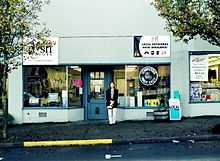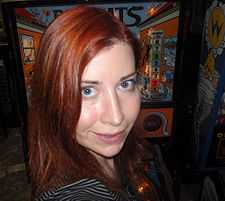Jeri Ellsworth
| Jeri Ellsworth | |
|---|---|
|
Jeri Ellsworth, 2008 | |
| Born |
1974 (age 40–41) Georgia[1] |
| Nationality | American |
| Occupation | Inventor |
| Known for | Entrepreneur and autodidact computer chip designer |

Jeri Ellsworth (born 1974) is an American entrepreneur and autodidact computer chip designer and inventor. Currently the president of Technical Illusions, she became known in 2004 for creating a complete Commodore 64 system on a chip within a joystick, called C64 Direct-to-TV. That "computer in a joystick" could run 30 video games from the early 1980s, and was a very popular Christmas gift, at peak selling over 70,000 units in a single day via the QVC shopping channel.[2] Ellsworth currently lives in Seattle.[3]
Biography
Ellsworth was born in Georgia,[1] and grew up in the towns of Dallas, Oregon and Yamhill, Oregon, where she was raised by her father, a local Mobil filling station owner. As a child, she persuaded her father to let her use a Commodore 64 computer which had been originally purchased for her brother. She taught herself to program by reading the C64's manuals. While at high school, she drove dirt-track race cars with her father, and then began designing new models in his workshop, eventually selling her own custom race cars. This allowed her to drop out of high school to continue the business.
In 1995, at the age of 21, she decided that she wanted to get away from the race car business,[4] and she and a friend started an early Intel 486-PC-based business, assembling and selling computers. When she and her partner later had a disagreement, Ellsworth opened a separate business in competition. This new business became a chain of four stores, "Computers Made Easy", selling computer equipment in towns in Oregon.[5] She ran that chain until selling it in 2000, at which point she moved to Walla Walla, Washington and attended Walla Walla College, studying circuit design for about a year. She dropped out due to a "cultural mismatch"; Ellsworth said that questioning professors' answers was frowned upon.[2]
In 2000, Ellsworth attended her first Commodore exposition, where she unveiled a prototype video expansion for the C64. This project later evolved to become the CommodoreOne, a.k.a. the C-One, and C64-DTV.
Ellsworth then began designing computer circuits that mimicked the behavior of her first computer, the Commodore 64. In 2002, she designed the chip used in the C-One[6] as an enhanced Commodore 64 which could also emulate other home computers of the early 1980s, including the VIC-20 and Sinclair ZX81. She and her fellow developer displayed the C-1 at a technology conference, which led to Ellsworth receiving a job offer from Mammoth Toys, which hired her to design the "computer in a chip" for the Commodore-emulating joystick. She began the project in June 2004, and had the project ready to ship by that Christmas. It sold over a half-million units, in the USA, Europe, and elsewhere.
Ellsworth is a pinball aficionado and owns over 80 pinball machines.[1]
From December 2008 until March 2009, Ellsworth hosted a weekly webcast, Fatman and Circuit Girl, together with George Sanger.[7][8]
On May 30, 2009, Ellsworth demonstrated her Home Chip Lab at Maker Faire Bay Area 2009.[9]
Ellsworth was named "MacGyver of the Day" on February 25, 2010 by Lifehacker.[10]
On December 3, 2010 she released information on how to build a TSA "naked" scanner using repurposed satellite antenna parts.[11]
Ellsworth has published numerous technical articles online regarding subjects as diverse as homemade semiconductors (2009), homemade electroluminescent (EL) displays (2010), EL phosphor manufacture from common ingredients and ways to make transparent EL backplanes without using expensive indium-tin-oxide coated glass.[12]
Ellsworth was a keynote speaker at the Embedded Systems Conference on May 5, 2011.[13]
Ellsworth has made significant contributions to ongoing work on DIY transistors in relation to rapid prototyping as well as thick film fabrication of EL displays using off the shelf chemicals.
In early 2012 Ellsworth was hired by Valve Corporation (along with several other notable hardware hackers) to work on gaming hardware.[14] Ellsworth was fired the following year,[15] along with several other Valve employees.[16][17]
On May 18, 2013, Ellsworth announced that she had developed an augmented reality development system named castAR with fellow ex-Valve engineer Rick Johnson,[18] with the blessing of Valve's Gabe Newell.[19] and would be funding it via Kickstarter later in the year. Her start-up company, Technical Illusions, is developing castAR.[20]
Ellsworth later revealed she had been secretly working to make castAR have "true VR and true AR" in addition to the previously announced projected AR capabilities.[21]
The castAR Kickstarter,[22] launched on October 14, 2013, reached its goal of $400,000 in 56 hours and finished with $1.05 million, 263% of the original goal.[23]
Presentations
- "Demo Coding with FPGAs: We Don't Need No Stinking CPUs". Notacon 5. April 4, 2008.
References
- ↑ 1.0 1.1 1.2 Lee, Nicole (October 17, 2014). "castAR bets big on its augmented reality hardware with move to Silicon Valley". Engadget. Retrieved February 7, 2015.
- ↑ 2.0 2.1 Markoff, John (December 20, 2004). "A Toy with a Story". New York Times.
- ↑ Ellsworth, Jeri (November 4, 2012). Short Circuits - One Bit ADC. Youtube.com. Retrieved 6 October 2014.
- ↑ "Jeri Ellsworth, self-taught engineer, talks about her career". Youtube.com. Retrieved 6 October 2014.
- ↑ Monahan, Matt (January 25, 2005). "Joy of electronics sticks with woman, sparking invention". Statesman Journal. Archived from the original on 2006-02-21. Retrieved 2011-03-22.
- ↑ "C-One website". C64upgra.de. Retrieved 2011-03-23.
- ↑ Branwyn, Gareth (28 April 2009). "Latest Fatman and Circuit Girl vids". Make. Retrieved 12 June 2014.
- ↑ Joyce, Matt (25 June 2009). "Fatman and Circuit Girl (Jeri Ellsworth - Rollerderby Superstar) Cover Noah’s AR Rig at Notacon". NYC Resistor. Retrieved 12 June 2014.
- ↑ "Events filled with DIY projects, science, demos, recycling, entertainment, and fun". Makerfaire.com. Retrieved 2011-03-23.
- ↑ Torrone, Phil (February 25, 2010). "MacGyver of the Day: Electronics Hacker Jeri Ellsworth". Lifehacker.com.
- ↑ "Make Your Own TSA "Naked" Scanner". Hack a Day. December 3, 2010. Retrieved 2011-03-23.
- ↑ "Make: Online | Jeri Ellsworth turns an LCD into an EL display". Blog.makezine.com. June 11, 2010. Retrieved 2011-03-23.
- ↑ "Jeri Ellsworth, self-taught engineer, talks about her career". YouTube. Retrieved 6 October 2014.
- ↑ ""I'm working at Valve on nextgen gaming hardware" - Jeri Ellsworth". valvetime.net.
- ↑ "Jeri Ellsworth on Twitter: "Yup. Got fired today. Time for new exciting projects."". Twitter.com. Retrieved 6 October 2014.
- ↑ "Gamasutra: Several out of work as Valve makes 'large decisions' about its future". Gamasutra.com. Retrieved 6 October 2014.
- ↑ Ben Gilbert. "Engadget: Valve's Gabe Newell on reported layoffs". Engadget. Retrieved 6 October 2014.
- ↑ How two Valve engineers walked away with the company's augmented reality glasses
- ↑ cast AR hands-on with Jeri Ellsworth at Maker Faire 2013, Engadget.com, retrieved 6 October 2014
- ↑ "Technical Illusions". Technicalillusions.com. Retrieved 6 October 2014.
- ↑ "CastAR VR / AR System - The 18 Month Story". YouTube. Retrieved 6 October 2014.
- ↑ "castAR: the most versatile AR & VR system". Kickstarter. Retrieved 6 October 2014.
- ↑ "castAR: the most versatile AR & VR system". Kicktraq.com. Retrieved 6 October 2014.
External links
| Wikimedia Commons has media related to Jeri Ellsworth. |
- Official website
- Stanford lecture, May 18, 2005
- Jeri Ellsworth#1 interviewed on the TV show Triangulation on the TWiT.tv network
